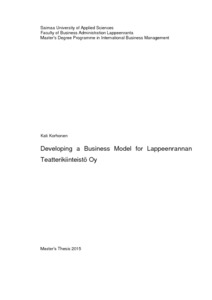Developing a Business Model for Lappeenrannan Teatterikiinteistö Oy
Korhonen, Kati (2015)
Korhonen, Kati
Saimaan ammattikorkeakoulu
2015
All rights reserved
Julkaisun pysyvä osoite on
https://urn.fi/URN:NBN:fi:amk-201505066471
https://urn.fi/URN:NBN:fi:amk-201505066471
Tiivistelmä
This thesis develops a business model for a real estate company and a subsidiary of the City of Lappeenranta. The case company is relatively new and has not yet started its business operations. Lappeenranta city theatre will be situated in this real estate and the theatre location is unique in Finland and worldwide. The research problem was defined in the following way: What are the available business model options for a real estate company starting its business. Which of the available options would create most value to the customer of Lappeenrannan Teatterikiinteistö Oy, the case company of this thesis?
The research method was a qualitative single case study. The study included a literature review. Altogether 19 semi-structured interviews were conducted in the case company, City of Lappeenranta and with chosen stakeholders. Three business model options were formed together with the case company and they were evaluated by the interviewees. A comparison of all three business model options was conducted and both SWOT and TOWS -analyse were made from the most popular business model.
Based on the interviews, this study recommends a service model which emphasizes that all key activities related to events are outsourced and the case company only takes care of real estate management. The situation should be evaluated again after the business operations are active and running. An in-house model would be more beneficial for the case company in the long run. Further emphasis should be placed on a more detailed business plan, which clarifies all chosen business model elements.
The research method was a qualitative single case study. The study included a literature review. Altogether 19 semi-structured interviews were conducted in the case company, City of Lappeenranta and with chosen stakeholders. Three business model options were formed together with the case company and they were evaluated by the interviewees. A comparison of all three business model options was conducted and both SWOT and TOWS -analyse were made from the most popular business model.
Based on the interviews, this study recommends a service model which emphasizes that all key activities related to events are outsourced and the case company only takes care of real estate management. The situation should be evaluated again after the business operations are active and running. An in-house model would be more beneficial for the case company in the long run. Further emphasis should be placed on a more detailed business plan, which clarifies all chosen business model elements.
